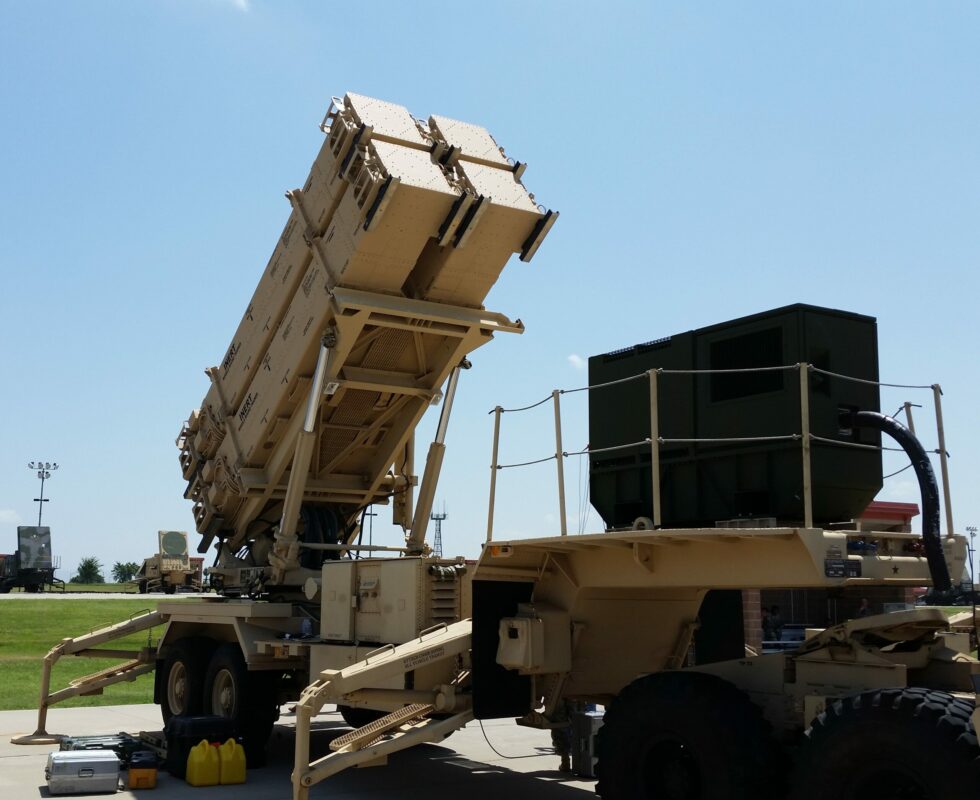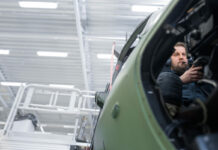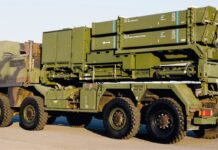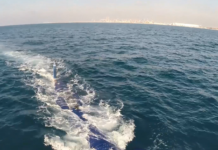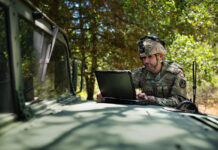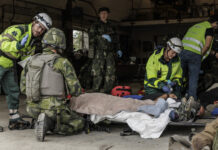A reliable electricity supply in the field is a backbone of defense capabilities, and as experts in hybridization, VINCORION’s power systems can generate this efficiently. As such, the technology company’s military power supply solutions play a key role in greening the armed forces. “In addition to tactical advantages, VINCORION’s hybrid technology saves a considerable amount of fuel and significantly cuts carbon emissions,” says Daniel Zeitler, Director of Product Management at VINCORION. “Equipped with our technology, military land vehicles can emit roughly 29 percent less carbon. And when used to power air defense systems, we can reduce carbon emissions by 33 percent.”
Zeitler demonstrates this using the example of VINCORION’s cutting-edge diesel gensets, which are available in a number of different performance classes. A state-of-the-art system with 15 kilowatts of power, for example, requires only 1.2 liters of diesel per hour. In contrast, the old system used 2.5 liters per hour. “Our new systems allow us to respond much more precisely to different load profiles and focus on efficiency in the design of the diesel engines,” Zeitler emphasizes. “We then use suitable hybrid elements, i.e., power storage modules, to handle peak loads. That gives us another major advantage – the ability to additionally use external power sources.” This includes, for example, electricity from the power grid or renewable energy sources. Grid operation has undeniable benefits – the system no longer consumes fuel locally and there’s zero wear and tear. And a major tactical advantage is that, in the event of an “emergency,” the gensets can switch over independently and without interruption thanks to the hybrid components and automated energy management.
This is because the power generation systems are also used to provide electricity to air defense systems. The power supply plays a major role in modernization as armed forces use increasingly powerful components. This is the case, for example, in the design of new radar systems such as the LTAMDS radar, or in the formation of entire protective shields, which are also intended to grow and have the ability to be linked together via plug-and-fight functionality. At the same time, however, components that conserve resources are also required, both with respect to reducing emissions as well as fuel consumption, and therefore operating costs.
Such components from VINCORION are, for example, part of the well-known Patriot system, for which the company has been a supplier for over 30 years. At an assumed yearly operational time of 2,000 hours per year, a Patriot unit with the older design would emit roughly 7.8 million tons of carbon. VINCORION’s new technology can reduce these emissions by more than 2.6 million metric tons – equal to a decrease of more than 33 percent.
But systematically reducing fossil fuel consumption not only lowers costs, reduces emissions, and lessens dependence on non-European sources. Above all, it makes it possible to reduce personnel deployment. As Zeitler explains, “requiring one third fewer refueling operations also means that up to 50 percent of the personnel previously needed to operate the power systems in the field can be deployed in other ways, such as for higher-value activities.” In the event of a conflict, this could also eliminate over 1/3 of the necessary fuel convoys, which would therefore no longer be targeted by the enemy.
German and European air defenses are currently being modernized as part of the European Sky Shield project, and “our contribution is the right power supply for all advanced defense systems that are going to be deployed as part of the European Sky Shield,” Zeitler emphasizes. This ranges from individual emplacements to entire interlinked chains of air defense systems.
“At VINCORION, our focus is on power and environmentally friendly power generation. Our new military diesel gensets for the German Armed Forces, which for the first time will be equipped with state-of-the-art exhaust systems that company with the EU Stage V emission standard, are a perfect example. As such, with our innovative technical solutions, we are ready to meet the requirements of tomorrow.” The company is working to contribute to the sustainability of the defense technology industry. Moving away from fossil fuels is firmly enshrined in NATO’s strategy. No matter what requirements may emerge over the next few years when it comes to greening the military, VINCORION is working to ensure that it is perfectly prepared to continue playing its role as a NATO partner in the future.
Contact:
Daniel Zeitler
Security and Defense
defense@vincorion.com


